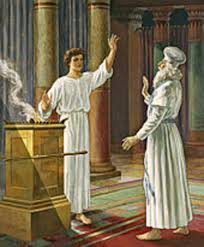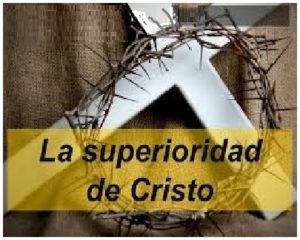Ab – Esquema del libro de Hebreos
Esquema del libro de Hebreos
La base de este comentario y bosquejo está tomada del Comentario del Nuevo Testamento de MacArthur sobre Hebreos.
Introducción a Hebreos desde una perspectiva judía (Ac)
Trasfondo de la Torá y de los sacrificios obsoletos (Ad)
Dificultades para los creyentes judíos (Ae)
Trasfondo del Brit Hadashah (Nuevo Pacto) y el Nuevo Sacrificio (Af)
La audiencia del libro de Hebreos (Ag)
I. La superioridad del Hijo en Su persona y Obra – 1:1 a 10:18 (Ah)
A. La superioridad del Mesías sobre los profetas – 1:1-3 (Ai)
B. La superioridad del Mesías sobre los ángeles – 1:4 a 2:18 (Aj)
1. Prueba de la superioridad del Mesías sobre los ángeles de las Escrituras – 1: 4-14 (Ak)
2. El peligro de la negligencia: judíos intelectualmente convencidos – 2:1-4 (Al)
3. Prueba de la soberanía del Mesías – 2: 5-9 (Am)
4. Prueba de la salvación por medio del Mesías – 2: 10-18 (An)
C. La superioridad del Mesías a Moisés – 3: 1-6 (Ao)
1. La superioridad del Mesías a Moisés en Su persona y obra – 3: 1-4 (Ap)
2. La superioridad del Mesías a Moisés en Su posición – 3:5-6 (Aq)
D. La superioridad del Mesías en el reposo que da – 3:7 a 4:13 (Ar)
1. El peligro de un corazón endurecido: judíos no convencidos – 3:7-19 (As)
2. Un día de reposo para el pueblo de Dios – 4:1-13 (At)
E. La superioridad del Mesías al sacerdocio levítico – 4:14 a 10:18 (Au)
1. El Mesías está en una mejor posición que Aarón – 4: 14-16 (Av)
2. El Mesías es mejor sacerdote que Aarón – 5: 1 – 7:28 (Aw)
a. Requisitos para el Gran Sumo Sacerdote – 5: 1-4 (Ax)
b. Los requisitos del Mesías como nuestro Gran Sumo Sacerdote – 5: 5-10 (Ay)
c. Incrédulos y creyentes en el Mesías – 5:11 – 6:20 (Az)
(1) Ustedes se han hecho tardos para oír: Judíos incrédulos – 5:11-14 (Ba)
(2) Una vez caído, es imposible volver al arrepentimiento: judíos indecisos – 6:1-8 (Bb)
(3) Tenemos esta esperanza como ancla para el alma – 6:9-20 (Bc)
d. El sacerdocio de Melquisedec – 7:1-28 (Bd)
(1) Melquisedec era un tipo de Cristo – 7: 1-3 (Be)
(2) El orden de Melquisedec y el orden de Aarón – 7: 4-10 (Bf)
(3) El sacerdocio levítico y el sacerdocio de Jesús – 7: 11-25 (Bg)
(a) El antiguo sacerdocio ha cambiado – 7: 11-14 (Bh)
(b) El sacerdocio anterior era temporal – 7: 15-19 (Bi)
(c) El nuevo sacerdocio es inmutable – 7: 20-22 (Bj)
(d) El nuevo sacerdocio dura para siempre – 7:23-25 (Bk)
(4) Yeshua el Sacerdote según el orden de Melquisedec – 7: 26-28 (Bl)
3. Un mejor pacto – 8: 1-13 (Bm)
a. La superioridad del nuevo pacto – 8: 1-6 (Bn)
b. Prueba de la superioridad del nuevo pacto – 8: 7-13 (Bo)
c. La dispensación de la gracia (Bp)
4. Un mejor santuario – 9: 1-10 (Bq)
a. La insuficiencia del antiguo santuario – 9: 1-5 (Br)
b. La insuficiencia del servicio sacerdotal anterior – 9: 6-7 (Bs)
c. La insuficiencia de los sacrificios anteriores – 9: 8-10 (Bt)
5. Un mejor sacrificio – 9:11 a 10:18 (Bu)
a. La superioridad del sacrificio del Mesías – 9: 11-12 (Bv)
b. Los resultados del sacrificio del Mesías – 9: 13-28 (Bw)
(1) La insuficiencia de la sangre de toros y cabras – 9: 13-14 (Bx)
(2) El perdón exige sangre – 9: 15-22 (By)
(3) El mejor tabernáculo purificado con la mejor sangre – 9: 23-28 (Bz)
c. El Mesías, el sacrificio perfecto – 10: 1-18 (Ca)
(1) La insuficiencia de los sacrificios levíticos – 10: 1- 4 (Cb)
(2) La suficiencia del sacrificio del Mesías – 10: 5-10 (Cc)
(3) El sacrificio del Mesías fue de una vez y para siempre – 10: 11-14 (Cd)
(4) Pondré mi Torá en sus corazones – 10: 15-18 (Ce)
II. La aplicación práctica de la supremacía del Hijo – 10:19 a 13:25 (Cf)
A. El sacrificio del Mesías abre el camino a Dios – 10:19-39 (Cg)
1. Acerquémonos a Dios – 10: 19-25 (Ch)
2. El peligro de la apostasía: judíos apóstatas – 10:26-39 (Ci)
B. Fe en acción – 11:1-40 (Cj)
1. Ahora la fe es la certeza de lo que se espera – 11:1-3 (Ck)
2. El Salón de la Fe – 11:4-40 (Cl)
a. La fe de Abel – 11:4 (Cm)
b. La fe de Enoc – 11:5-6 (Cn)
c. La fe de Noé – 11:7 (Co)
d. La fe de Abraham – 11:8-19 (Cp)
e. La fe de Isaac – 11:20 (Cq)
f. La fe de Jacob – 11:21 (Cr)
g. La fe de José – 11:22 (Cs)
h. La fe de Moisés – 11: 23-29 (Ct)
i. La fe de Rahab en Jericó – 11:30-31 (Cu)
j. La fe a través de las pruebas – 11:32-40 (Cv)
C. La fe para correr el maratón del creyente – 12:1 a 13:25 (Cw)
1. Fe y disciplina – 12: 1-11 (Cx)
a. Estamos rodeados por una gran nube de testigos – 12:1-3 (Cy)
b. Dios disciplina a sus hijos – 12:4-11 (Cz)
2. Advertencia y ánimo para los creyentes – 12:12-29 (Da)
a. Quedando destituidos de la gracia de Dios – 12:12-17 (Db)
b. El monte Sinaí terrenal y el monte Sión celestial – 12:18-29 (Dc)
3. El comportamiento del creyente en relación con los demás – 13:1-3 (Dd)
4. El comportamiento del creyente en relación con si mismo – 13:4-9 (De)
5. El comportamiento del creyente en relación con Dios – 13:10-19 (Df)
6. Bendición y Saludos Finales – 13:20-25 (Dg)
Glosario (Dh)
Notas finales (Di)
Bibliografía (Dj)
PÁGINA SIGUIENTE: Introducción a Hebreos desde una perspectiva judía Ac



 முதல் நாளாகமம் 24 இல், டேவிட் ராஜா லேவி கோத்திரத்தை இருபத்து நான்கு பிரிவுகளாகப் பிரித்தார். ஒவ்வொரு பிரிவினரும் இரண்டு வாரங்களுக்கு ஒரு வருடத்திற்கு இரண்டு முறை கோயில் சடங்குகளின் தினசரி செயல்பாடுகளை கவனித்துக்கொள்வார்கள். பெசாக், ஷாவுட் மற்றும் சுக்கோட் ஆகிய முக்கிய புனித யாத்திரை திருவிழாக்களில், அனைத்துப் பிரிவினரும் சேவை செய்தனர். ஒரு பிரதான பாதிரியார் இருந்தார், அவருக்குக் கீழே இருபது தலைமை ஆசாரியர்கள் இருந்தனர், அவர்களுக்குக் கீழ் இருபத்தி நான்கு படிப்புகளின் உறுப்பினர்கள் இருந்தனர், அவர்கள் பொதுவான பாதிரியார்களாக இருந்தனர். . சகரியா ஒரு பொதுவான பாதிரியார், அவர் அபியாவின் ஆசாரிய வகுப்பைச் சேர்ந்தவர். சாதாரண பாதிரியார்களின் கடமைகள் சீட்டு மூலம் தேர்ந்தெடுக்கப்பட்டன. பல லேவியர்கள் இருந்தனர், இருப்பினும், அவர்கள் பொதுவாக தங்கள் வாழ்நாளில் ஒரே ஒரு வாய்ப்பு மட்டுமே சேவை செய்ய வேண்டும். இருந்தபோதிலும், ஒவ்வொரு வருடமும் ஐந்து முறை கோவிலில் நடக்கும் புனிதப் பணிகளில் பங்கேற்பதற்காக ஸகர்யா தனது வீட்டிலிருந்து ஏறிச் சென்றார்.38
முதல் நாளாகமம் 24 இல், டேவிட் ராஜா லேவி கோத்திரத்தை இருபத்து நான்கு பிரிவுகளாகப் பிரித்தார். ஒவ்வொரு பிரிவினரும் இரண்டு வாரங்களுக்கு ஒரு வருடத்திற்கு இரண்டு முறை கோயில் சடங்குகளின் தினசரி செயல்பாடுகளை கவனித்துக்கொள்வார்கள். பெசாக், ஷாவுட் மற்றும் சுக்கோட் ஆகிய முக்கிய புனித யாத்திரை திருவிழாக்களில், அனைத்துப் பிரிவினரும் சேவை செய்தனர். ஒரு பிரதான பாதிரியார் இருந்தார், அவருக்குக் கீழே இருபது தலைமை ஆசாரியர்கள் இருந்தனர், அவர்களுக்குக் கீழ் இருபத்தி நான்கு படிப்புகளின் உறுப்பினர்கள் இருந்தனர், அவர்கள் பொதுவான பாதிரியார்களாக இருந்தனர். . சகரியா ஒரு பொதுவான பாதிரியார், அவர் அபியாவின் ஆசாரிய வகுப்பைச் சேர்ந்தவர். சாதாரண பாதிரியார்களின் கடமைகள் சீட்டு மூலம் தேர்ந்தெடுக்கப்பட்டன. பல லேவியர்கள் இருந்தனர், இருப்பினும், அவர்கள் பொதுவாக தங்கள் வாழ்நாளில் ஒரே ஒரு வாய்ப்பு மட்டுமே சேவை செய்ய வேண்டும். இருந்தபோதிலும், ஒவ்வொரு வருடமும் ஐந்து முறை கோவிலில் நடக்கும் புனிதப் பணிகளில் பங்கேற்பதற்காக ஸகர்யா தனது வீட்டிலிருந்து ஏறிச் சென்றார்.38 கிமு 4 இல் இறந்த யூதேயாவின் மன்னரான ஹெரோது தி கிரேட் காலத்தில் Z’karyah க்கு கடவுளின் அறிவிப்பு நடந்தது. இஸ்ரயேல் மக்களின் அரசியல் நிலை பரிதாபகரமாக இருந்தது மற்றும் அவர்களின் ஆன்மீக நிலை வீழ்ச்சியடைந்தது. குற்றத்தின் அரக்கனான ஏரோது அவர்களை ஒடுக்கினார், மேலும் பாரசீக யூத மதத்தின் கீழ் அவர்களது நம்பிக்கை விழாக்கள் மற்றும் சடங்குகளின் வெற்று அமைப்பாக மாறிவிட்டது. ஆனால், அந்த ஆவிக்குரிய வறட்சியின் நடுவே, லேவி கோத்திரத்தைச் சேர்ந்த சகரியா என்ற ஒரு பாதிரியாரும், ஆரோனின் வழித்தோன்றலாக இருந்த அவருடைய மனைவி எலிசபெத்தும் இருந்தார்கள் (லூக்கா 1:5).41 மனைவிகளைத் தேர்ந்தெடுப்பதில் மிகுந்த கவனம் செலுத்தப்பட்டது. குருமார்கள், அதனால் குடும்பம் எல்லா வகையிலும் கறைபடாமல் இருக்க வேண்டும் என்பதற்காக. 42 எனவே, ஜ்கார்யா இரட்டிப்பாக ஆசீர்வதிக்கப்பட்டார், ஏனெனில் ரபீக்கள்
கிமு 4 இல் இறந்த யூதேயாவின் மன்னரான ஹெரோது தி கிரேட் காலத்தில் Z’karyah க்கு கடவுளின் அறிவிப்பு நடந்தது. இஸ்ரயேல் மக்களின் அரசியல் நிலை பரிதாபகரமாக இருந்தது மற்றும் அவர்களின் ஆன்மீக நிலை வீழ்ச்சியடைந்தது. குற்றத்தின் அரக்கனான ஏரோது அவர்களை ஒடுக்கினார், மேலும் பாரசீக யூத மதத்தின் கீழ் அவர்களது நம்பிக்கை விழாக்கள் மற்றும் சடங்குகளின் வெற்று அமைப்பாக மாறிவிட்டது. ஆனால், அந்த ஆவிக்குரிய வறட்சியின் நடுவே, லேவி கோத்திரத்தைச் சேர்ந்த சகரியா என்ற ஒரு பாதிரியாரும், ஆரோனின் வழித்தோன்றலாக இருந்த அவருடைய மனைவி எலிசபெத்தும் இருந்தார்கள் (லூக்கா 1:5).41 மனைவிகளைத் தேர்ந்தெடுப்பதில் மிகுந்த கவனம் செலுத்தப்பட்டது. குருமார்கள், அதனால் குடும்பம் எல்லா வகையிலும் கறைபடாமல் இருக்க வேண்டும் என்பதற்காக. 42 எனவே, ஜ்கார்யா இரட்டிப்பாக ஆசீர்வதிக்கப்பட்டார், ஏனெனில் ரபீக்கள் தூபங்காட்டும் நேரம் வந்தபோது, கூடிவந்திருந்த எல்லா ஆராதனையாளர்களும் வெளியே ஜெபித்துக் கொண்டிருந்தார்கள் (லூக்கா 1:10). அந்த நேரத்தில் சகரியா முழு யூத தேசத்தின் மையப்புள்ளியாக இருந்தார். பின்னர், அவரது ஆசாரிய வாழ்க்கையின் உச்சக்கட்டத்தில், தூப மேகம் எழத் தொடங்கியதும், பலிபீடத்தின் வலது பக்கத்தில் நின்றபடி, கர்த்தருடைய தூதன் அவருக்குத் தோன்றினார். Z’karyah அவரைப் பார்த்ததும், அவர் திடுக்கிட்டார் மற்றும் பயத்தால் பிடிக்கப்பட்டார், உண்மையில் பயம் அவர் மீது விழுந்தது. ஆனால், தேவதூதரின் செய்தி நியாயத்தீர்ப்பு மற்றும் மரணம் அல்ல, மாறாக ஆசீர்வாதம் மற்றும் வரவிருக்கும் புதிய வாழ்க்கை. தேவதூதன் அவரிடம், “சக்கரியாவே, பயப்படாதே; உங்கள் பிரார்த்தனை கேட்கப்பட்டது. உன் மனைவி எலிசேவா உனக்கு ஒரு குமாரனைப் பெறுவாள், நீ அவனை யோகனான் என்று அழைப்பாய்” (லூக்கா 1:11-13). ஜான் என்பதற்கான எபிரேய வார்த்தையின் அர்த்தம் கருணை, இது புதிய கிருபையின் காலகட்டத்தை சுட்டிக்காட்டுகிறது (
தூபங்காட்டும் நேரம் வந்தபோது, கூடிவந்திருந்த எல்லா ஆராதனையாளர்களும் வெளியே ஜெபித்துக் கொண்டிருந்தார்கள் (லூக்கா 1:10). அந்த நேரத்தில் சகரியா முழு யூத தேசத்தின் மையப்புள்ளியாக இருந்தார். பின்னர், அவரது ஆசாரிய வாழ்க்கையின் உச்சக்கட்டத்தில், தூப மேகம் எழத் தொடங்கியதும், பலிபீடத்தின் வலது பக்கத்தில் நின்றபடி, கர்த்தருடைய தூதன் அவருக்குத் தோன்றினார். Z’karyah அவரைப் பார்த்ததும், அவர் திடுக்கிட்டார் மற்றும் பயத்தால் பிடிக்கப்பட்டார், உண்மையில் பயம் அவர் மீது விழுந்தது. ஆனால், தேவதூதரின் செய்தி நியாயத்தீர்ப்பு மற்றும் மரணம் அல்ல, மாறாக ஆசீர்வாதம் மற்றும் வரவிருக்கும் புதிய வாழ்க்கை. தேவதூதன் அவரிடம், “சக்கரியாவே, பயப்படாதே; உங்கள் பிரார்த்தனை கேட்கப்பட்டது. உன் மனைவி எலிசேவா உனக்கு ஒரு குமாரனைப் பெறுவாள், நீ அவனை யோகனான் என்று அழைப்பாய்” (லூக்கா 1:11-13). ஜான் என்பதற்கான எபிரேய வார்த்தையின் அர்த்தம் கருணை, இது புதிய கிருபையின் காலகட்டத்தை சுட்டிக்காட்டுகிறது (



 இயேசுவின் பிறப்பு மற்றும் ஆரம்பகால வாழ்க்கையைப் பற்றி கவனிக்க வேண்டிய ஒரு விஷயம் என்னவென்றால், நாம் அறியக்கூடிய அனைத்தும் மத்தேயு மற்றும் லூக்காவில் மட்டுமே காணப்படுகின்றன. மார்க் அல்லது ஜான் அல்ல. மட்டித்யாஹு மற்றும் லூக்கா மட்டுமே உண்மையில் கிறிஸ்துவின் கதை அல்லது பிறப்பு மற்றும் ஆரம்பகால வாழ்க்கையை நமக்குத் தருகிறார்கள். இருப்பினும், அவர்கள் இரண்டு வெவ்வேறு கோணங்களில் இருந்து கதை சொல்கிறார்கள். மத்தேயு ஜோசப்பின் பார்வையில் இருந்து கதையைச் சொல்கிறார், அதே நேரத்தில் லூக்கா மேரியின் பார்வையில் அதே கதையைச் சொல்கிறார். மட்டித்யாஹுவில், யோசெஃப் செயலில் உள்ள பாத்திரத்தில் நடிக்கிறார், மிரியம் ஒரு செயலற்ற பாத்திரத்தில் நடிக்கிறார். மட்டித்யாஹு ஜோசப் என்ன நினைக்கிறார் என்பதை பதிவு செய்கிறார், ஆனால், மேரி என்ன நினைக்கிறார் என்பதை அல்ல. யோசேப்புக்கு தேவதூதர்கள் எப்படி வந்தார்கள் என்பது பதிவு செய்யப்பட்டுள்ளது, ஆனால், மரியாளுக்கு தேவதூதர்கள் தோன்றவில்லை. மாறாக, லூக்காவின் நற்செய்தி மிரியமின் பார்வையில் இருந்து கதையைச் சொல்கிறது. லூக்காவின் நற்செய்தியில், மிரியம் செயலில் பங்கு வகிக்கிறார், யோசெப் செயலற்ற பாத்திரத்தில் நடிக்கிறார். மரியாளுக்கு தேவதூதர்கள் எப்படி தோன்றுகிறார்கள் என்பது பதிவு செய்யப்பட்டுள்ளது, ஆனால் யோசேப்புக்கு அல்ல. மிரியம் என்ன நினைக்கிறார் என்பதை லூக்கா தெரிவிக்கிறார், ஜோசப் என்ன நினைக்கிறார் என்பதை அல்ல.37
இயேசுவின் பிறப்பு மற்றும் ஆரம்பகால வாழ்க்கையைப் பற்றி கவனிக்க வேண்டிய ஒரு விஷயம் என்னவென்றால், நாம் அறியக்கூடிய அனைத்தும் மத்தேயு மற்றும் லூக்காவில் மட்டுமே காணப்படுகின்றன. மார்க் அல்லது ஜான் அல்ல. மட்டித்யாஹு மற்றும் லூக்கா மட்டுமே உண்மையில் கிறிஸ்துவின் கதை அல்லது பிறப்பு மற்றும் ஆரம்பகால வாழ்க்கையை நமக்குத் தருகிறார்கள். இருப்பினும், அவர்கள் இரண்டு வெவ்வேறு கோணங்களில் இருந்து கதை சொல்கிறார்கள். மத்தேயு ஜோசப்பின் பார்வையில் இருந்து கதையைச் சொல்கிறார், அதே நேரத்தில் லூக்கா மேரியின் பார்வையில் அதே கதையைச் சொல்கிறார். மட்டித்யாஹுவில், யோசெஃப் செயலில் உள்ள பாத்திரத்தில் நடிக்கிறார், மிரியம் ஒரு செயலற்ற பாத்திரத்தில் நடிக்கிறார். மட்டித்யாஹு ஜோசப் என்ன நினைக்கிறார் என்பதை பதிவு செய்கிறார், ஆனால், மேரி என்ன நினைக்கிறார் என்பதை அல்ல. யோசேப்புக்கு தேவதூதர்கள் எப்படி வந்தார்கள் என்பது பதிவு செய்யப்பட்டுள்ளது, ஆனால், மரியாளுக்கு தேவதூதர்கள் தோன்றவில்லை. மாறாக, லூக்காவின் நற்செய்தி மிரியமின் பார்வையில் இருந்து கதையைச் சொல்கிறது. லூக்காவின் நற்செய்தியில், மிரியம் செயலில் பங்கு வகிக்கிறார், யோசெப் செயலற்ற பாத்திரத்தில் நடிக்கிறார். மரியாளுக்கு தேவதூதர்கள் எப்படி தோன்றுகிறார்கள் என்பது பதிவு செய்யப்பட்டுள்ளது, ஆனால் யோசேப்புக்கு அல்ல. மிரியம் என்ன நினைக்கிறார் என்பதை லூக்கா தெரிவிக்கிறார், ஜோசப் என்ன நினைக்கிறார் என்பதை அல்ல.37








 Hebreos es un impresionante retrato de Yeshua el Mesías visto a través del lente del TaNaJ. La intención del autor, bajo la influencia del Espíritu Santo (Ruaj HaKodesh), es mostrar la superioridad de Jesús sobre los profetas, ángeles, Moisés, sacerdotes, y la totalidad del sistema levítico. Cristo es el nuevo sacerdote con el nuevo sacrificio que establece un nuevo pacto entre YHVH y Su pueblo.
Hebreos es un impresionante retrato de Yeshua el Mesías visto a través del lente del TaNaJ. La intención del autor, bajo la influencia del Espíritu Santo (Ruaj HaKodesh), es mostrar la superioridad de Jesús sobre los profetas, ángeles, Moisés, sacerdotes, y la totalidad del sistema levítico. Cristo es el nuevo sacerdote con el nuevo sacrificio que establece un nuevo pacto entre YHVH y Su pueblo.